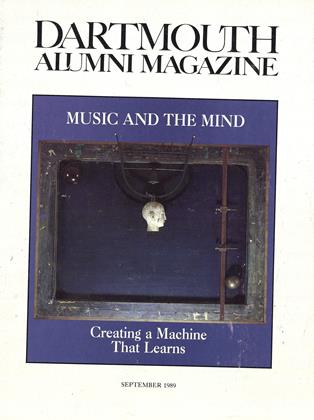1769
Although Eleazar Wheelock is rumored to have brought 500 gallons of rum with him when he came to Hanover, the quantity seems unlikely given available transportation. Charlie Widmayer '30, the former editor of this magazine, estimates that the amount was closer to 31 or 62 gallons. One of Wheelock's main concerns, incidentally, is keeping students away from local taverns.
1923
Prohibition changes campus life. "There have been instances where Attitudes toward Dartmouth's spirits have changed since 1950, when this man posed using them as a study aid. (At least, we hope he was posing.)
students awoke on the morning after a 'bootleg party,' quietly packed their belongings and departed without waiting for the faculty's inexorable doom," reports the New York Sun. Anti-bootlegging committees are posted at dances and other social events to watch for signs of inebriation. Nonetheless, many Dartmouth students reportedly make roadtrips to Montreal to purchase alcohol.
1924
President Ernest Martin Hopkins '01 warns residents of fraternity houses that any student known to be guilty of "procuring intoxicating liquors" will be subject to College discipline. Any student caught drunk is to be expelled.
1935
Robert Holbrook Smith '02, popularly known as Dr. Bob, founds Alcoholics Anonymous.
1946
Dean of the College L.K. Neidlinger reprimands "howling drunk" Dartmouth men who imbibed during Homecoming weekend. If such activities continue, he warns, fraternity parties will be eliminated "as sure as God made little green apples."
1952
Neidlinger proposes alcohol regulations. Two weeks later, 2,000 students march in a torchlight protest, accompanied by cymbals and firecrackers. The parade ends after midnight at Neidlinger's house. When the dean emerges, he is met with shouts of, "We want a beer." The College coincidentally announces the dean's resignation the following day.
1985
The New Hampshire drinking age, once 18, is increased to 21, rendering three out of four undergraduates unable to drink legally.
1987
During Green Key weekend, Hanover police send an underaged woman into fraternity basements, accompanied by an undercover officer. Although she is turned down by some houses, others serve her illegally. The College places eight fraternities on social probation.
1989
Dartmouth surveys show that College students are consuming significantly less alcohol.
 View Full Issue
View Full Issue
More From This Issue
-
 Cover Story
Cover StoryMUSIC AND THE MIND
September 1989 By Jay Heinrichs and Karen Endicott -
 Feature
FeatureA Cure for Nostalgia: the Ultimate Comp Exam
September 1989 By Nancy Staab '90 -
 Feature
FeatureSAILING FOR HOME
September 1989 By Heather Killebrew '89 -
 Feature
FeatureSon of Animal House
September 1989 By Ed. -
 Article
ArticleThe man who wrote the movie returns to find brothers in slime.
September 1989 By Chris Miller '63 -
 Article
ArticleDR WHEELOCK'S JOURNAL
September 1989
Article
-
 Article
ArticleTWO DARTMOUTH CONGRESSMEN ELECTED FROM NEW ENGLAND
December 1924 -
 Article
Article'22 Lawyer Judged "Tireless"
SEPTEMBER 1988 -
 Article
ArticleMIT BIT
SEPTEMBER 1991 -
 Article
ArticleA Man of Many Hats
September 1995 -
 Article
ArticleThe College as a Cooperative Enterprise
OCTOBER 1931 By Ernest Martub Hopkins -
 Article
Article"We Are Responsible"
July 1952 By F. LEE COULTER JR. '52

